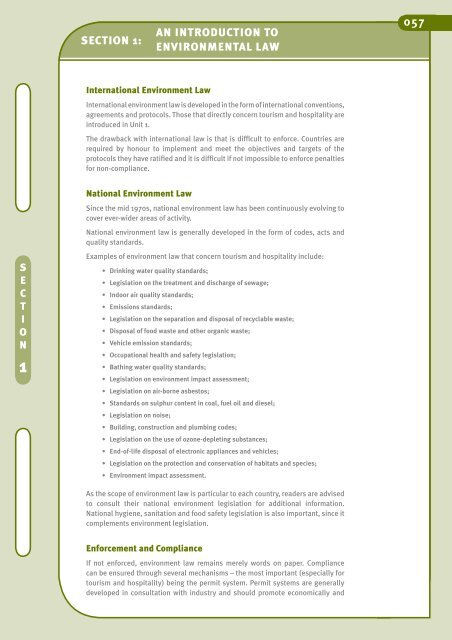Online version: PDF - DTIE
Online version: PDF - DTIE
Online version: PDF - DTIE
You also want an ePaper? Increase the reach of your titles
YUMPU automatically turns print PDFs into web optimized ePapers that Google loves.
SECTION 1:<br />
AN INTRODUCTION TO<br />
ENVIRONMENTAL LAW<br />
057<br />
International Environment Law<br />
International environment law is developed in the form of international conventions,<br />
agreements and protocols. Those that directly concern tourism and hospitality are<br />
introduced in Unit 1.<br />
The drawback with international law is that is difficult to enforce. Countries are<br />
required by honour to implement and meet the objectives and targets of the<br />
protocols they have ratified and it is difficult if not impossible to enforce penalties<br />
for non-compliance.<br />
S<br />
E<br />
C<br />
T<br />
I<br />
O<br />
N<br />
1<br />
National Environment Law<br />
Since the mid 1970s, national environment law has been continuously evolving to<br />
cover ever-wider areas of activity.<br />
National environment law is generally developed in the form of codes, acts and<br />
quality standards.<br />
Examples of environment law that concern tourism and hospitality include:<br />
• Drinking water quality standards;<br />
• Legislation on the treatment and discharge of sewage;<br />
• Indoor air quality standards;<br />
• Emissions standards;<br />
• Legislation on the separation and disposal of recyclable waste;<br />
• Disposal of food waste and other organic waste;<br />
• Vehicle emission standards;<br />
• Occupational health and safety legislation;<br />
• Bathing water quality standards;<br />
• Legislation on environment impact assessment;<br />
• Legislation on air-borne asbestos;<br />
• Standards on sulphur content in coal, fuel oil and diesel;<br />
• Legislation on noise;<br />
• Building, construction and plumbing codes;<br />
• Legislation on the use of ozone-depleting substances;<br />
• End-of-life disposal of electronic appliances and vehicles;<br />
• Legislation on the protection and conservation of habitats and species;<br />
• Environment impact assessment.<br />
As the scope of environment law is particular to each country, readers are advised<br />
to consult their national environment legislation for additional information.<br />
National hygiene, sanitation and food safety legislation is also important, since it<br />
complements environment legislation.<br />
Enforcement and Compliance<br />
If not enforced, environment law remains merely words on paper. Compliance<br />
can be ensured through several mechanisms – the most important (especially for<br />
tourism and hospitality) being the permit system. Permit systems are generally<br />
developed in consultation with industry and should promote economically and
















